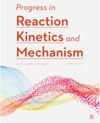Impact of Chloride Concentration on Ligand Substitution Reactions of Zinc(II) Complexes with Biologically Relevant Nitrogen Nucleophiles
IF 2.1
4区 化学
Q3 CHEMISTRY, PHYSICAL
Progress in Reaction Kinetics and Mechanism
Pub Date : 2018-10-01
DOI:10.3184/146867818X15319903829164
引用次数: 2
Abstract
The mole-ratio method was used to determine the metal–ligand stoichiometry between [ZnCl2(en)] and [ZnCl2(terpy)] (where en = 1,2-diaminoethane or ethylenediamine and terpy = 2,2′:6′,2″-terpyridine) and imidazole at pH 7.2 in the presence of different chloride concentrations. The results indicated step-wise formation of 1:1 and 1:2 complexes in the presence of 0.010 M NaCl and 1:1 complexes in the presence of 0.001 M NaCl for the [ZnCl2(en)] complex. These results are correlated with additional coordination of chlorides in the first coordination sphere and with changes in coordination geometry. In the presence of 0.001 M NaCl the five-coordinate complex anion [ZnCl3(en)]- is formed initially and then a substitution reaction with imidazole occurs. In the presence of 0.010 M NaCl the octahedral complex anion [ZnCl4(en)]2- is formed. Additional coordination of chloride in the [ZnCl2(terpy)] complex is not found and the metal–ligand stoichiometry is 1:2. The kinetics of ligand substitution reactions of zinc(II) complexes and biologically relevant nitrogen nucleophiles such as imidazole, 1,2,3-triazole and L-histidine were investigated at pH 7.2 as a function of nucleophile concentration in the presence of 0.001 M and 0.010 M NaCl. The reactions were followed under pseudo first-order conditions by UV-Vis spectrophotometry. The substitution reactions included two steps of consecutive displacement of chlorido ligands with changes only in the coordination geometry of the [ZnCl2(en)] complex. The order of reactivity of the investigated nucleophiles for the first reaction step towards both complexes was L-histidine > 1,2,3-triazole > imidazole, while in the presence of 0.010 M NaCl the most reactive ligand was 1,2,3-triazole towards the [ZnCl2(en)] complex.氯离子浓度对锌(II)配合物与亲核试剂配体取代反应的影响
采用摩尔比法测定了[ZnCl2(en)]和[ZnCl2(terpy)] (en = 1,2-二氨基乙烷或乙二胺,terpy = 2,2′:6′,2″-三吡啶)与咪唑在pH为7.2条件下的金属配体化学计量。结果表明,[ZnCl2(en)]配合物在0.010 M NaCl存在下可逐步形成1:1和1:2的配合物,在0.001 M NaCl存在下可形成1:1的配合物。这些结果与第一配位球中氯化物的附加配位以及配位几何的变化有关。在0.001 M NaCl存在下,首先形成五配位阴离子[ZnCl3(en)]-,然后与咪唑发生取代反应。在0.010 M NaCl存在下,形成八面体配合阴离子[ZnCl4(en)]2-。在[ZnCl2(terpy)]配合物中没有发现氯的额外配位,金属配体化学计量为1:2。研究了锌(II)配合物与咪唑、1,2,3-三唑和l -组氨酸等生物相关的氮亲核试剂在pH 7.2条件下,在0.001 M和0.010 M NaCl存在下,其配体取代反应的动力学与亲核试剂浓度的关系。用紫外-可见分光光度法在伪一级条件下对反应进行了跟踪。取代反应包括氯基配体连续位移的两个步骤,仅改变[ZnCl2(en)]配合物的配位几何形状。研究的亲核试剂对这两个配合物的第一步反应活性顺序为l -组氨酸> 1,2,3-三唑>咪唑,而在0.010 M NaCl存在下,对[ZnCl2(en)]配合物反应活性最高的配体是1,2,3-三唑。
本文章由计算机程序翻译,如有差异,请以英文原文为准。
求助全文
约1分钟内获得全文
求助全文
来源期刊
CiteScore
2.10
自引率
0.00%
发文量
5
审稿时长
2.3 months
期刊介绍:
The journal covers the fields of kinetics and mechanisms of chemical processes in the gas phase and solution of both simple and complex systems.

 求助内容:
求助内容: 应助结果提醒方式:
应助结果提醒方式:


